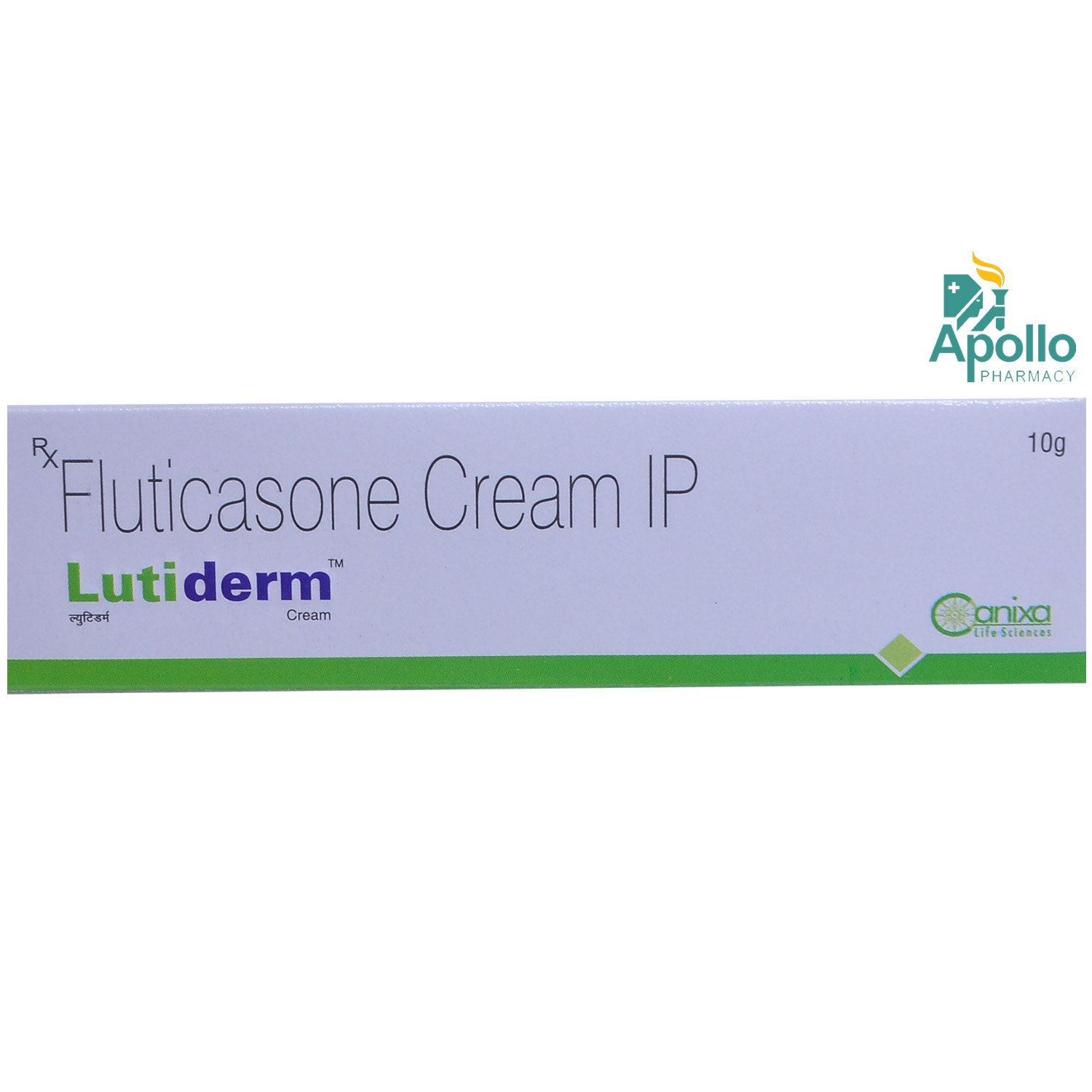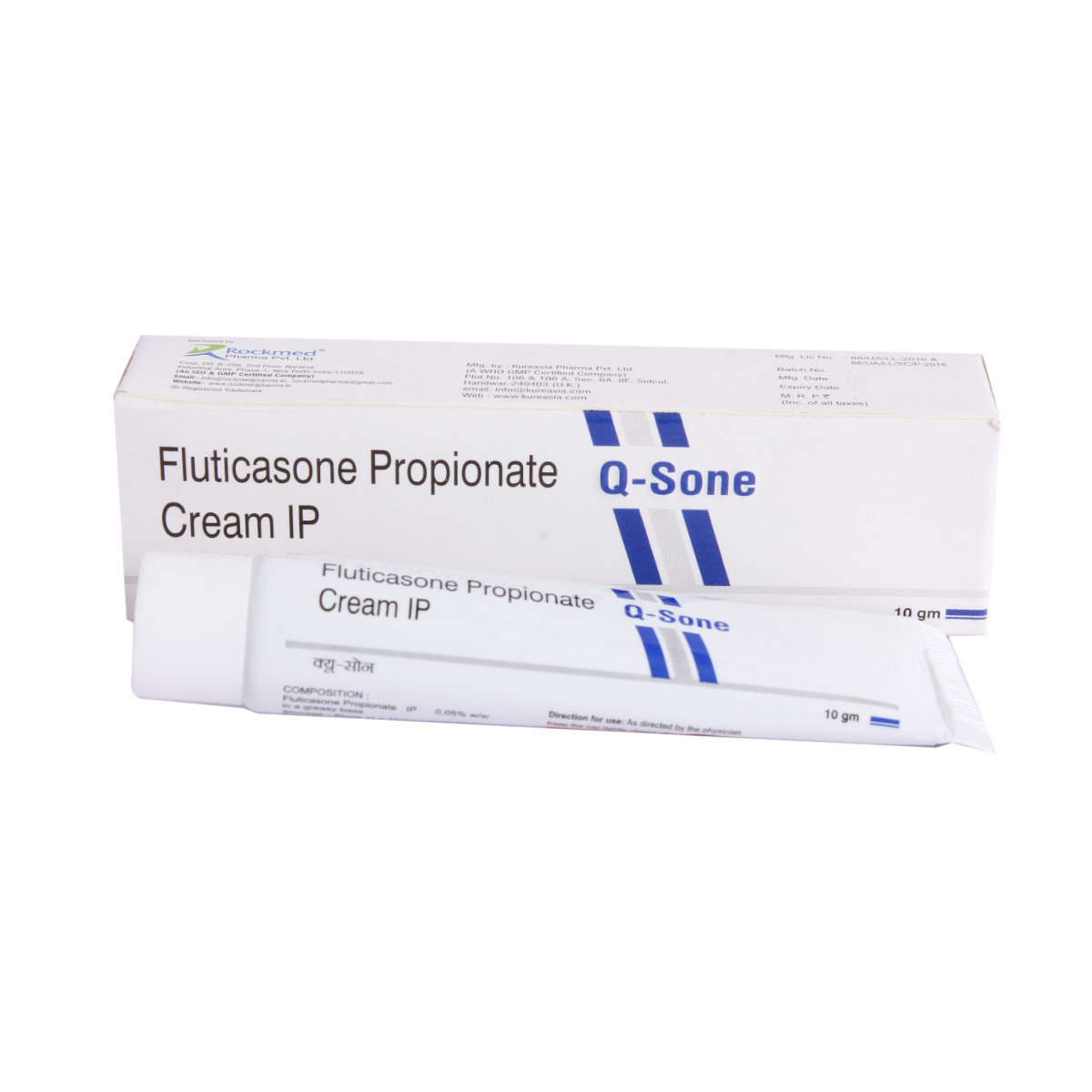Lutivate Cream 30 gm
MRP ₹150
(Inclusive of all Taxes)
₹22.5 Cashback (15%)
Provide Delivery Location
Online payment accepted
 Prescription drug
Prescription drugWhats That
Composition :
Manufacturer/Marketer :
Consume Type :
Return Policy :
About Lutivate Cream 30 gm
Lutivate Cream 30 gm belongs to the class of corticosteroid medication used to treat itching, swelling, and irritation in skin conditions such as psoriasis, eczema, contact dermatitis, lichen planus (a type of rash), and lupus. Psoriasis is a skin condition characterised by flaky patches of skin covered with scales. Eczema is a skin disorder that causes dry, red, itchy, and rough skin. Contact dermatitis is a skin condition triggered by contact with allergens.
Lutivate Cream 30 gm includes Fluticasone, a corticosteroid with anti-inflammatory properties on the skin. It reduces swelling, redness, and itching by inhibiting the production of certain chemical messengers in the body that cause inflammation. Thus, Lutivate Cream 30 gm aids in treating various skin inflammatory conditions.
Lutivate Cream 30 gm is for external use only. In some cases, Lutivate Cream 30 gm may cause side effects such as itching, burning sensation, increased erythema (redness of the skin), urticaria (skin rash), irritation, and light-headedness. Most of these side effects do not require medical attention and gradually resolve over time. However, if the side effects persist or worsen, consult a doctor.
Inform your doctor if you are allergic to any of the components in Lutivate Cream 30 gm or have any other skin infection, cuts, broken skin or itchy skin that is not inflamed or red. And also, inform the doctor if you are trying to get pregnant, are already pregnant, or are breastfeeding. Lutivate Cream 30 gm should be used under the supervision of a paediatrician.
Uses of Lutivate Cream 30 gm
Directions for Use
Key Benefits
Lutivate Cream 30 gm is used to treat skin conditions such as psoriasis, eczema, contact dermatitis, lichen planus (a type of rash), and lupus. Lutivate Cream 30 gm contains Fluticasone which reduces swelling, redness, and itching by inhibiting the production of certain chemical messengers in the body that cause inflammation. Thus, Lutivate Cream 30 gm aids in treating skin conditions such as psoriasis, eczema and dermatitis.
Storage
- Report the itching to your doctor immediately; they may need to change your medication or dosage.
- Use a cool, damp cloth on the itchy area to help soothe and calm the skin, reducing itching and inflammation.
- Keep your skin hydrated and healthy with gentle, fragrance-free moisturizers.
- Try not to scratch, as this can worsen the itching and irritate your skin.
- If your doctor prescribes, you can take oral medications or apply topical creams or ointments to help relieve itching.
- Track your itching symptoms and follow your doctor's guidance to adjust your treatment plan if needed. If the itching persists, consult your doctor for further advice.
Drug Warnings
Inform your doctor if you are allergic to any of the components in Lutivate Cream 30 gm, have a skin infection, broken skin, cuts or itchy skin that is not inflamed or red. Consult your doctor if you are trying to get pregnant, are already pregnant, or are breastfeeding. If you have a relapse of your condition within two weeks of quitting therapy, consult your doctor.
Drug-Drug Interactions
Drug-Drug Interactions
Login/Sign Up
Drug-Food Interactions
Drug-Food Interactions
Login/Sign Up
Diet & Lifestyle Advise
- Wear loose-fitting clothing to avoid increased sweating and the spread of infection.
- Avoid scratching the infected skin area as it might spread the infection to other body parts.
- Towels, combs, bed sheets, shoes, and socks should not be shared with others.
- Wash your bed sheets and towels regularly.
- Limit or avoid the intake of alcohol and caffeine.
- Do not scratch or pick at the affected region to avoid infecting it.
- Choose natural foods and grains over processed items. Limiting starch intake may also help reduce inflammation.
- Processed foods and foods heavy in sugar and fat should be avoided because they might induce inflammation.
- Limit your salt intake and choose natural anti-inflammatory agents like herbs or spices like garlic, ginger, and turmeric.
Side Effects of Lutivate Cream 30 gm
- Itching
- Burning sensation
- Increased erythema (redness of the skin)
- Urticaria (skin rash)
- Irritation
- Light-headedness
Habit Forming
Therapeutic Class
All Substitutes & Brand Comparisons
RX
Out of StockFlutisoft Cream 15 gm
Windesr Healthcare
₹90
(₹5.4/ 1gm)
8% COSTLIERRX
Out of StockFloroft Cream 10 gm
Walberg Pharmaceuticals
₹75
(₹6.75/ 1gm)
35% COSTLIERRX
Out of StockFlute Cream 5 gm
Hetero Healthcare Pvt Ltd
₹37.89
(₹6.82/ 1gm)
36% COSTLIER
Author Details
We provide you with authentic, trustworthy and relevant information
Drug-Diseases Interactions
Drug-Diseases Interactions
Login/Sign Up
Corticosteroids are primarily eliminated by hepatic metabolism, hence liver dysfunction may cause them to accumulate. Hepatic disease patients need to be closely watched.
How to manage the interaction:
Liver disease patients using Lutivate Cream 30 gm should be monitored closely.
Rarely, the use of nasal and inhaled corticosteroids may cause hyperadrenocorticism or worsen its symptoms. Corticosteroid side effects can be lessened by administering them locally rather than systemically, although the dangers are still present. Drugs that are applied topically or inhaled may enter the bloodstream, especially when high concentrations are utilised. It is crucial that the lowest effective dosage be used and that the recommended dosages of the various products not be exceeded. During inhaled or nasal corticosteroid medication, the emergence of symptoms such irregular menstruation, acneiform lesions, cataracts, and cushingoid features may signify overuse.
How to manage the interaction:
The use of inhaled and nasal corticosteroids such as Lutivate Cream 30 gm may rarely precipitate or aggravate conditions of hyperadrenocorticism. Hence, you are advised not to use more than the recommended dosages.
In patients with ocular herpes simplex, pharmacologic doses of corticosteroids may raise the risk of corneal perforation. In such patients, corticosteroid therapy should be delivered with caution, both orally and inhalation.
How to manage the interaction:
Inhaled and nasal Lutivate Cream 30 gm should be used with caution in patients with ocular herpes simplex (a type of viral eye infection).
Long-term inhalation of corticosteroids may cause a decline in bone density. This effect, which has mostly been documented with high dosages (>= 800 mcg/day of beclomethasone or similar for >= 1 year), appears to be dose-related. Patients getting lesser dosages have also been shown to have lower levels of total body calcium. Patients with osteoporosis should be treated with inhaled and nasal corticosteroids over the long term with caution. It is crucial that the lowest effective dosage be used and that the recommended dosages of the various products not be exceeded.
How to manage the interaction:
Long-term therapy with inhaled and nasal corticosteroids should be used with caution in patients with osteoporosis. It is advised not to exceed more than the recommended dosages.
FAQs
Special Advise
- Avoid contact of Lutivate Cream 30 gm with the nose, mouth, or eyes. In case of accidental contact with these areas, rinse with water thoroughly.
Disease/Condition Glossary
Psoriasis: Psoriasis is a skin disorder characterised by flaky patches of skin covered with scales. It is a long-term (chronic) condition that often involves periods of none or mild symptoms followed by periods of severe symptoms. The severity of psoriasis varies widely across individuals.
Eczema: Eczema is a condition in which the skin becomes red, swollen, and irritated, occasionally with small blisters resulting from direct skin irritation or an allergic reaction to an external factor.
Dermatitis: Dermatitis is a rash that appears red and itchy after coming into contact with allergens. When the allergen causing the problem is identified and avoided, dermatitis usually improves or disappears completely.
Lichen planus: Lichen planus is an inflammatory disease of the skin and mucous membranes. Lichen planus shows as purplish, itchy, flat-topped pimples on the skin. It produces lacy, white patches on mucous membranes, such as the mouth, often with painful ulcers.
Lupus: Lupus is an inflammatory disease that occurs when the immune system attacks the body's tissues. Lupus can induce inflammation in various physiological systems, including the joints, skin, kidneys, blood cells, brain, heart, and lungs.

Have a query?
Alcohol
Safe if prescribed
It is not known if alcohol affects Lutivate Cream 30 gm. Please consult your doctor.
Pregnancy
Consult your doctor
Lutivate Cream 30 gm should only be used if the dermatologist or skin specialist has prescribed and supervised the therapy. Please consult your doctor if you have any concerns.
Breast Feeding
Consult your doctor
Please consult the doctor. It is given to nursing mothers only if the doctor thinks the benefits outweigh the risks. If you are using Lutivate Cream 30 gm on your breasts, wash off Lutivate Cream 30 gm from your breasts before feeding your baby.
Driving
Safe if prescribed
Lutivate Cream 30 gm does not impact your ability to drive or operate machinery.
Liver
Consult your doctor
Please consult your doctor if you have liver problems. Your doctor will prescribe only if the benefits outweigh the risks.
Kidney
Consult your doctor
Please consult your doctor if you have kidney problems. Your doctor will prescribe only if the benefits outweigh the risks.
Children
Safe if prescribed
Lutivate Cream 30 gm should be used under the supervision of a paediatrician.











_0.jpg?tr=q-85)
